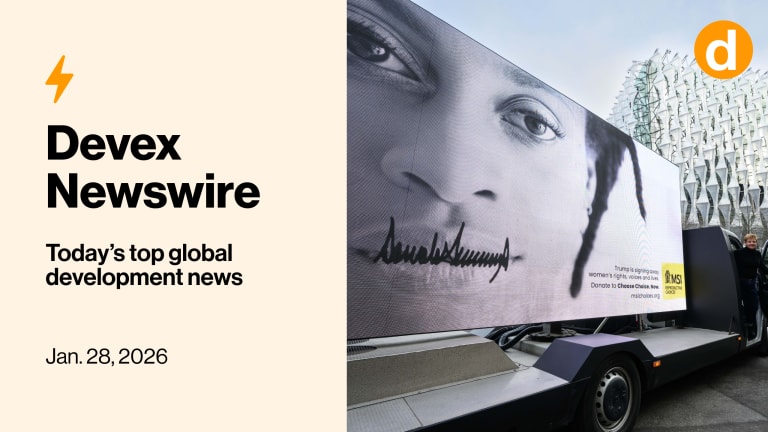
In June 2020, as people around the world rose up to challenge racial injustice in all its forms, including within our global development sector, Women Deliver was confronted by hard truths. We had failed to embody the very values that are foundational to who we are.
Women Deliver launches investigation following staffers' allegations of racism
Women Deliver CEO Katja Iversen took a leave of absence while an outside organization investigated former employees' statements. Some observers have called for additional action.
In marking the passing of the baton, two years later, and as we head into a new chapter of our ongoing journey to meaningfully transform into an anti-racist organization, we, Women Deliver’s past and future leaders, want to recognize the emotional labor that has gone into this process, both on the part of those who called on us to radically change, and those who worked with us to make that change happen.
We want to take a moment to share the lessons we’ve learned along the way. In doing this, we hope to support our colleagues in the sector, many of whom are facing similar challenges, to transition to anti-racist, feminist, and decolonialized organizational models.
Lesson 1: Reexamining who we are and how we communicate
Over the past two years, we publicly reexamined our organization DNA, our power, and our privilege, in order to understand who we were, who we wanted to be moving forward, and the changes we needed to make to get there.
In practice, this meant both clearly defining the very concepts that guide our work and organizational strategy, including gender equality, anti-racism, and decolonization, and revising our policies and practices.
With support from experts in feminist leadership, management, and partnership principles, we held the space needed to transform how we communicate, how we partner with others, and how we define success itself.
Concretely, we reexamined our five-year strategic framework to ensure that an intersectional approach serves as the foundation of all of our programming. We built out and reexamined our ethical communications standards, including by prioritizing translation and interpretation in multiple languages, and having staff at every level take the lead on speaking and writing about our work.
We redefined success not as achieving a set goal, but rather as having taken the time and dedicated the resources needed to truly listen and look inward, and do the hard work needed to center the advocates we work with at the outset of planning to drive equitable, inclusive, and sustainable progress.
Lesson 2: Recentering our partners
In rethinking how we partner with others, we listened intently to those closest to us: The Women Deliver Young Leaders, Deliver for Good Country Coalition leaders, our funders, and our partners around the world at the grassroots level, within the United Nations system, and in the private sector. Together, they offered over 140 recommendations reinforcing the crucial importance of an intersectional approach, led by adolescents, youth, and women’s rights organizations in low- and middle-income countries.
We are committed to … decentralizing our operations by progressively hiring staff from around the world, and particularly from [low- and middle-income countries].
—Across all teams, and at all levels, we discussed the essential ingredients of partnerships during many honest — and tough — conversations. We began actively leveraging our power and influence more intentionally than ever to center the work and expertise of women’s rights and youth-led organizations in LMICs, and to position accessibility and inclusion as the first and most essential component of every action we take, across all aspects of our programing, and most notably in planning the Women Deliver 2023 Conference, or WD2023.
For example, for the first time, the WD2023 Advisory Group was selected via an open-application process, and we are currently undertaking an accessibility audit of the WD2023 website and conference itself.
We have also revised our partnership principles, implemented trust-based grant making processes, and provided honorariums and tech stipends to the advocates we work with, including Women Deliver Young Leaders involved with the newly formed Alumni Committee.
Throughout 2021, we executed a global recruitment process that was inclusive, highly participatory, and applied an intersectional feminist lens in order to broaden Women Deliver’s board of directors, which today is made up of grassroots leaders and Young Leader alums.
Lesson 3: Restoring trust within and outside our walls
In parallel to shifting power into the hands of our partners, we shifted power within the organization itself into the hands of new leaders. These are leaders who challenge the status quo, share our values, and understand where we would like to go next. We also shifted power to staff themselves.
Women from LICs hold only 1% of health nonprofit board seats
A report serves as a stark reminder of how much more needs to be done to decolonize global health.
Today, we are structured and led in a way that enables staff at every level to contribute to the most vital aspects of our work, including our board meetings, strategy, partnership approach, communications, principles, and internal, trust-based policies.
Our salary bands are fully transparent, and rather than a management team, senior focals at different levels of seniority meet around key moments to discuss and mutually align on Women Deliver’s actions. These changes have been essential to building back trust within and outside our organization.
Lasting change takes time: Looking to the future
Throughout this journey, we’ve gained a first-hand understanding of the need to move from incremental adjustments toward a radical and honest reexamination of the actions needed to transform the essence of our organization. The changes we have made have required time, emotional labor, and resources to achieve. And they’ve been hard.
We still don’t always get it right, particularly when balancing the need and our strong desire to give everything we can to the process of co-creating all aspects of our work — including by dedicating the time and resources needed to do this well — while also safeguarding staff bandwidth. In the long term, we are committed to further decolonizing Women Deliver and decentralizing our operations by progressively hiring staff from around the world, and particularly from LMICs.
As we continue to work to do and be better in the lead up to WD2023, we hope that the lessons presented here can help others in our sector as they continue or begin to carve out their own transformation journey.









